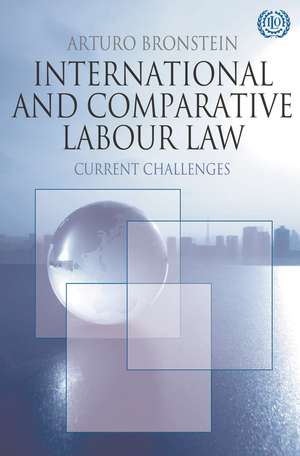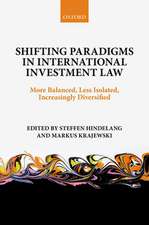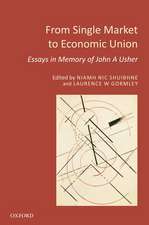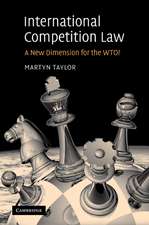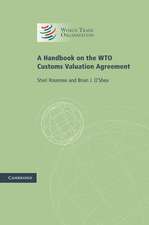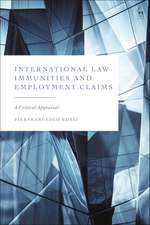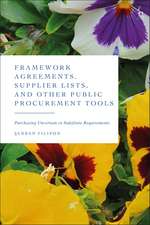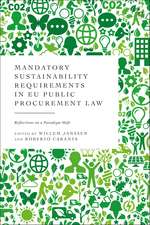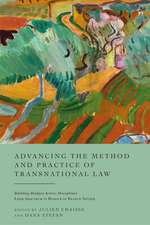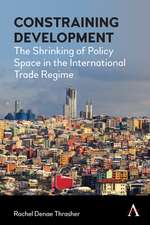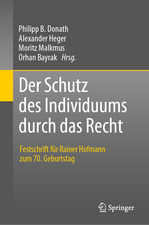International and Comparative Labour Law: Current Challenges
Autor Arturo Bronsteinen Limba Engleză Paperback – 7 mai 2009
Preț: 436.93 lei
Preț vechi: 603.69 lei
-28% Nou
Puncte Express: 655
Preț estimativ în valută:
83.60€ • 87.53$ • 69.18£
83.60€ • 87.53$ • 69.18£
Carte disponibilă
Livrare economică 15-29 martie
Preluare comenzi: 021 569.72.76
Specificații
ISBN-13: 9780230228221
ISBN-10: 0230228224
Pagini: 320
Ilustrații: footnotes
Dimensiuni: 156 x 234 x 18 mm
Greutate: 0.48 kg
Ediția:2009
Editura: Bloomsbury Publishing
Colecția Red Globe Press
Locul publicării:London, United Kingdom
ISBN-10: 0230228224
Pagini: 320
Ilustrații: footnotes
Dimensiuni: 156 x 234 x 18 mm
Greutate: 0.48 kg
Ediția:2009
Editura: Bloomsbury Publishing
Colecția Red Globe Press
Locul publicării:London, United Kingdom
Caracteristici
Written with a firm grasp of the underlying human rights at play in labour law, showing the progress that has been made globally in recent decades, and considering that which is still to be made
Notă biografică
ARTURO BRONSTEIN specializes in international and comparative labour law. In recent years he provided advice on the revision of the Labour Law in several countries of Central Europe, such as (then) Serbia-Montenegro, Bosnia-Herzegovina, Romania, Ukraine, Slovakia and the territory of Kosovo. He also advised in 2001 the government of Cambodia, on the adoption of rules on enterprise level collective bargaining and collective disputes arbitration. He has authored many publications in the field of labour law and labour relations. Having served at the ILO for 21 years, culminating in an appointment to Senior Labour Policy Advisor, Arturo Bronstein, has been influential in putting in place labour standards internationally. He left the ILO in November 2005, and since retiring has been lecturing on international and comparative labour law at the universities of Buenos Aires (Argentina), York (Ontario, Canada) and Paris X-Nanterre (France). He is the current Secretary General of the International Society for Labour and Social Security Law: http://www.asociacion.org.ar/ISLLSS
Cuprins
PART I:LABOUR LAW AT A CROSSROADS Labour Law's Origins and Influences Sources of Labour Law The Labour Maw model From 1945 to 1975 The Standard Employment Relationship Worldwide Changes and the Emergence of a New Work Paradigm Stagflation and the Labour Flexibility Debate International Competition Technological Change and the Emergence of Post-Fordist Organizational Patterns The End of the Cold War Current Crises in Labour Law PART II:WHO IS PROTECTED BY LABOUR LAW? Labour Law and the Informal Economy Towards a Legal Definition of the Informal Economy Policy Issues Atypical Work: From Rejection to Integration in Labour Law Dependent-independent Workers and the Defocusing of the Employment Relationship Disguised Employment Relationships Decentralization of Production and its Impact on Labour and Employment Relations Challenges That Decentralization of Production Poses for Labour Law PART III:SECURITY OF EMPLOYMENT Unfair Dismissal An Increasing Number of Exceptions... That do not Reverse the Rule Limitations on the Abuse of Fixed-term Employment Contracts Remedies Against Unfair Dismissal PART IV:GLOBAL TRADE AND LABOUR LAW Is Substandard Labour a Legitimate Comparative Advantage? Strategies to Address the Relationship Between International Trade and Labour Rights International and Supranational Rules Harmonization The Social Clause: From WTO to ILO The ILO Declaration on Fundamental Principles and Rights at Work, 1998 Labour-related Provisions in Multilateral and Bilateral Trade Agreements Unilateral Social Clauses: The Generalized System of Preferences Corporate Social Responsibility (CSR) PART V:LEGAL SUBORDINATION AND THE FUNDAMENTAL RIGHTS OF THE PERSON Gender Discrimination Equal Pay Exceptions to the Equal Pay Rule Equal Treatment of Men and Women Access to Certain Jobs Pregnancy Night Work, Underground Work and Other Jobs Prohibited for Women Race Discrimination Religious Belief Other Kinds of Discrimination Family Responsibilities Sexual Harassment Sexual Orientation Age Disability State of Health and HIV/AIDS Affirmative (or positive) Action Protection of Privacy Video and Telephone Surveillance Freedom of Thought and Expression PART VI:REGIONAL PERSPECTIVES The European Union and the Emergence of Supranational Law The Impact of Recent ECJ Rulings on Labour Relations in the European Union Labour Law in Former Communist Countries Latin America Asia and the Pacific South Africa PART VII:FINAL REMARKS.
